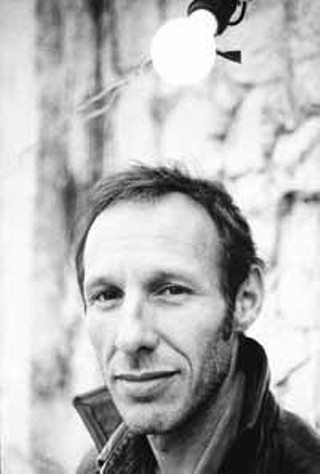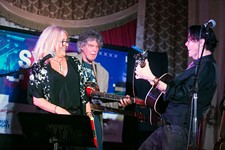Welcome to the Underground
Here comes David Baerwald
By Jim Caligiuri, Fri., July 19, 2002

David Baerwald is the type of guy best described as wiry. Slight of build, he has a firm handshake and piercing green eyes. Peppered with brown flecks, they're notably expressive as the gateway to a man who has lived a full existence. The few wrinkles on Baerwald's elastic skin speak to that life's ups and downs, even though he's just a couple of years past 40. Whatever life has dealt Baerwald, he perseveres, and in the process, he's made music the world needs to hear.
This week, Baerwald makes his debut for the Lost Highway label with Here Comes the New Folk Underground. The title is deceptive. Although he's a singer-songwriter, it's folk music in the most literal sense: by and for "folks." Some of the songs possess a rustic tone; others are slinky blue-eyed soul. All of them hang together with a purpose, exposing a dark period in Baerwald's life that ultimately led to a stance that's both defiant and life affirming. It's an album with the rare combination of passion, grit, funk, country-rock, and truth. It's music to move you, no matter what it's called.
Baerwald is a relative newcomer to Austin. He moved to Texas in November of 2001 to put together a touring band for this project. It was quite a ride getting here.
Born in Oxford, Ohio, in 1960, his family moved to Los Angeles in the mid-Sixties. His father was a political science instructor, whose work took the family to Japan for a time. They eventually settled in L.A. in the Seventies.
"Just in time for me to join the Less Than Zero crowd," cracks Baerwald.
The youngest of three children, with two older sisters, Baerwald picked up one of his sibling's guitars before he was 10. The punk explosion had just hit, and he tried to fit in.
"We were just a bunch of twerpy nerds and rich kids," he recalls. "I was playing bass in those days with a band called the Spastics. It was more of a youth gang than a real band. I think a lot of punk bands were that way; there were a lot of people who were in bands, but were really car thieves or drug dealers."
After high school, he drifted through a series of odd jobs, including one that involved doing story analysis for Orion Pictures. "You'd take a book or screenplay and distill it to three paragraphs," he explains, "and do it in the style of what you were writing about." There was a lot discipline involved and it helped Baerwald in his penchant for songwriting.
Then there was what he refers to as a series of problems with local law enforcement that led to a change in lifestyle. "I moved in with my parents who were going through a divorce," he continues. "I still had all that aggro, youthful energy. I needed a place to put it. I called up Dave Ricketts, who wanted to score film. He was a friend of a friend."
A lot of people will recall the duo David & David, who scored a bona fide hit in 1986 with "Welcome to the Boomtown." Baerwald says that making music with Ricketts was therapy.
"I wasn't really making it for anyone. I wasn't thinking about record companies or the music business. Somehow our tape ended up on the desk of Jordan Harris, the A&R guy at A&M Records. The next thing I knew, we were on MTV 20 times a day. It was very disorienting."
A surprise hit with its glossy surfaces and memorable melodies, Boomtown was deceptively smooth. Beneath the slick production, the songs were tales of despair and broken dreams in the era of Ronald Reagan.
"We didn't play a single show until after the record came out," Baerwald recalls. "I still don't know what happened. I was in a lot of trouble with a lot of different things and I was engaged in this 'young guy catharsis' thing. It was a couple of screw-ups in someone's bedroom with a portastudio, that's all it was.
"And talk about an unlikely duo, I was wrestling with paranoia and depression, and he was essentially agoraphobic. One day I was looking at 15 years in prison and he was a set painter at a movie studio, and the next we're being asked our opinion on world events. Both of us were freaked. It was like 'What happened?'"
Despite their success, David & David didn't last, Boomtown being their only release. Baerwald attempted a solo career and made two albums, Bedtime Stories in 1990 and Triage in 1992. While both were critical successes, sales didn't match the Boomtown days, and a growing antagonism toward the music business led him to composing music for films, television, and commercials. He received a Golden Globe nomination for "Come What May" from Moulin Rouge! and was involved with films like Clueless, Reality Bites, and The Pledge, among others.
"I rejected having a solo career," he claims. "The whole thing seemed like a bunch of shit. Narcissism, egomania, vanity. I don't consider those attractive qualities, and I don't know how they became the gold standard in today's culture. To have that world as the only arrow in my quiver seemed like a suicidal way of working. Plus I declared war with Polygram. I had the worst breakup with them of any I have ever heard of. I personally insulted a bunch of the people that worked there. They wanted me to be Sheryl Crow's slave and I didn't want to do that."
Baerwald was, in fact, an important part of Crow's 1993 debut, Tuesday Night Music Club, as one of its guitarists and co-writer of seven of its 11 songs. It was that recording that bore the seeds for the New Folk Underground.
The sad reality is that between Tuesday Night Music Club and New Folk Underground, there was a long stretch of death and devastation for Baerwald. Among other things, his friend John O'Brien, who wrote the novel Leaving Las Vegas, an inspiration for the song of the same name on Crow's album, committed suicide. Kevin Gilbert, who was a member of Crow's band, passed away. Bill Bottrell, who produced Tuesday Night Music Club, lost his 7-year-old son William in 1998. Throughout it all, Baerwald took refuge in writing songs.
"I never stopped writing," he claims, "but these songs were for my own benefit. I didn't expect or even think there would be a purpose in releasing them.
"Then one day my mom was on the Internet looking for relatives and found this fan page. It seemed my music was important to a lot of them. I ended up recording all the songs I had written. Someone suggested I give it to the people on the fan page. I was genuinely touched by their interest."
The recordings ended up as a two-CD, 28-song set called A Fine Mess. A copy ended up on the desk of Luke Lewis, head of Lost Highway, who was intrigued enough to sign Baerwald to the fledgling label late in 2001. A Fine Mess was then winnowed down to a single disc, two tracks recorded in Austin completing the CD. Local hero Will Sexton, a songwriting friend of Baerwald's from the early Nineties, is given co-production credit on the disc and was put in charge of forming the band once Baerwald got here.
"The thing I've always responded to about David," relates Sexton, "is how loyal he is to his point of view. I think it lets him make brutally honest, unremitting music, because it's so clearly his point of view and it's pretty stout."
Sexton pauses a moment and then adds with a laugh, "I love him for it, ya know?"
Baerwald expands on those sentiments by explaining what the New Folk Underground has come to mean to him.
"It's something I have no right at all to espouse," he posits. "I have no folk credibility. It's an attack on artifice and dishonesty on a musical level. I spent a long time trying to make something out of nothing. When William died, I didn't have that in me to continue what I was doing at the time. I needed to do something absolutely direct and absolutely lacking in trendiness; something that was expressing exactly what it was and nothing else.
"In L.A. in 1998, that felt like an extremely rebellious attitude. At Capitol Studios, they had this stamp that they put on rough mix tapes that were given to musicians and producers that was 'NFU.' That's what this felt like to me: Not for use. This is my own thing. This was not for money. NFU transmogrified into New Folk Underground."
Baerwald claims he was listening to artists like Gillian Welch, Wilco, Dock Boggs, the O'Jays, and Curtis Mayfield while recording New Folk Underground, and that they had a big effect on its sound. He says that he asked himself what these artists had in common. Why did they mean something to him?
"The answer was that they that accepted pain and suffering as a given and found a way of fighting it without being morose," says Baerwald succinctly. "I felt that I was watching evil triumph, hypocrisy and propaganda ruling the airwaves, and the death of rock & roll, a medium that I felt really strongly about. The death of a lot of people that meant a lot to me in my personal life [was also a factor].
"So whether I was this successful L.A. shithead or not, I was in pain. I didn't have a way to express it, yet I was attracted to these acts that were so naked about it and unbeaten by it. That became my definition of what folk music is: It's of the people. Music unbowed, sprung from an acceptance that life is difficult." ![]()








